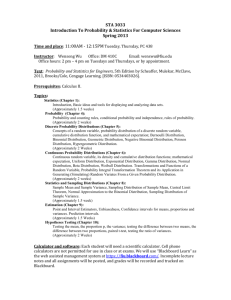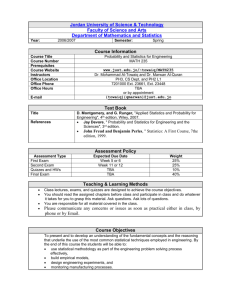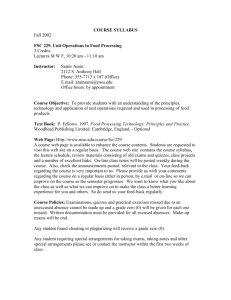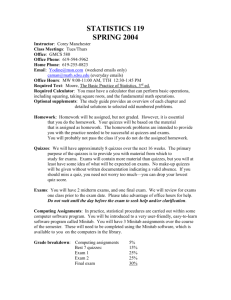Eastern Oregon University
advertisement
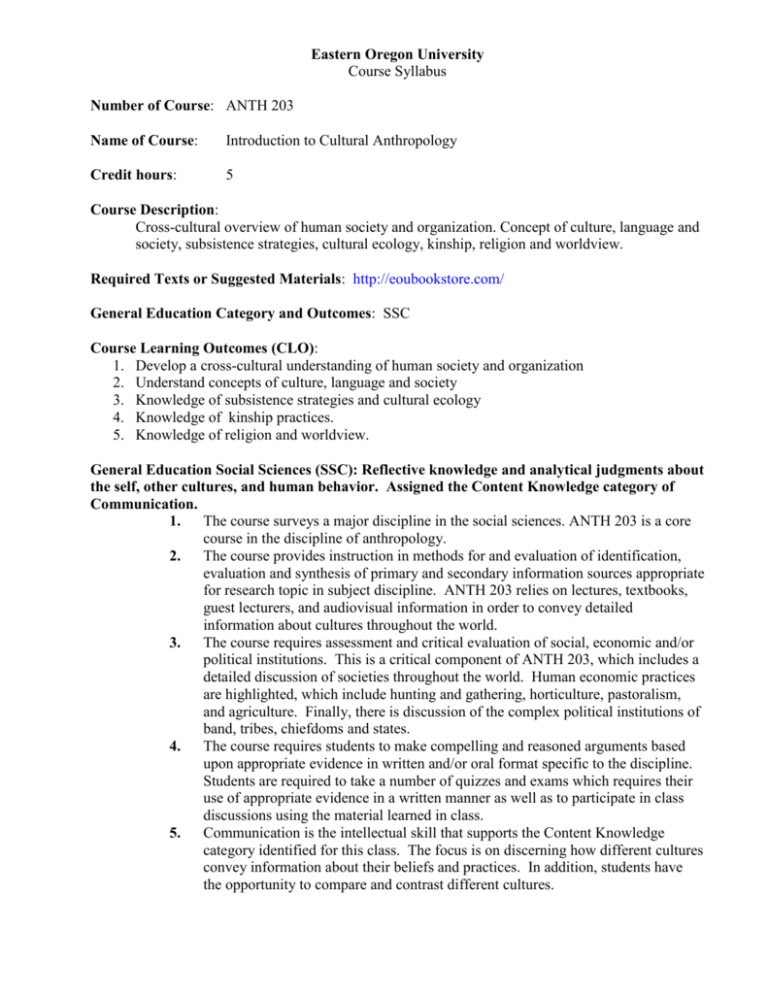
Eastern Oregon University Course Syllabus Number of Course: ANTH 203 Name of Course: Introduction to Cultural Anthropology Credit hours: 5 Course Description: Cross-cultural overview of human society and organization. Concept of culture, language and society, subsistence strategies, cultural ecology, kinship, religion and worldview. Required Texts or Suggested Materials: http://eoubookstore.com/ General Education Category and Outcomes: SSC Course Learning Outcomes (CLO): 1. Develop a cross-cultural understanding of human society and organization 2. Understand concepts of culture, language and society 3. Knowledge of subsistence strategies and cultural ecology 4. Knowledge of kinship practices. 5. Knowledge of religion and worldview. General Education Social Sciences (SSC): Reflective knowledge and analytical judgments about the self, other cultures, and human behavior. Assigned the Content Knowledge category of Communication. 1. The course surveys a major discipline in the social sciences. ANTH 203 is a core course in the discipline of anthropology. 2. The course provides instruction in methods for and evaluation of identification, evaluation and synthesis of primary and secondary information sources appropriate for research topic in subject discipline. ANTH 203 relies on lectures, textbooks, guest lecturers, and audiovisual information in order to convey detailed information about cultures throughout the world. 3. The course requires assessment and critical evaluation of social, economic and/or political institutions. This is a critical component of ANTH 203, which includes a detailed discussion of societies throughout the world. Human economic practices are highlighted, which include hunting and gathering, horticulture, pastoralism, and agriculture. Finally, there is discussion of the complex political institutions of band, tribes, chiefdoms and states. 4. The course requires students to make compelling and reasoned arguments based upon appropriate evidence in written and/or oral format specific to the discipline. Students are required to take a number of quizzes and exams which requires their use of appropriate evidence in a written manner as well as to participate in class discussions using the material learned in class. 5. Communication is the intellectual skill that supports the Content Knowledge category identified for this class. The focus is on discerning how different cultures convey information about their beliefs and practices. In addition, students have the opportunity to compare and contrast different cultures. ANTH 203, Pg 2 Means of Assessment: Grading: 60 points 300 points 20 points 380 points Quizzes (each quiz is worth 10 points) (Best 6 scores) (CLO 1-5) (SSC 1-5) Exams (each exam is worth 100 points) (Best 3 exam scores) (CLO 1-5) (SSC 1-5) Participation on Thursdays (2 points each Thursday) (CLO 1-5) (SSC 1-5) Total number of points possible **All grades will be posted in Blackboard. GRADING SCALE: 94-100 A 90-93 A87-89 B+ 84-86 B 80-83 77-79 74-76 70-73 BC+ C C- 67-69 64-66 60-63 0-59 D+ D DF **The Grading Scale is used to determine your final grade. Course Requirements: Quizzes: There are 7 quizzes that will be given online through Blackboard each Monday and will be available from 10am-4pm. You are only required to take 6 of the seven quizzes. If you should take all 7 quizzes, I will use your best 6 scores in determining your final grade. No make-up quizzes will be offered. Quizzes will be on any material covered as part of the class (lectures, book, websites, films and guest lectures). They are in a multiple choice and true/false format. (CLO 1-5) (SSC 1-5) Exams: There are 4 exams, including the one given during Finals week. Exam 1 covers the material presented during Weeks 1-3 and Exam 2 covers information presented during Weeks 4-6 and Exam 3 covers material presented during Weeks 7-10. Exam 4 is comprehensive and covers material covered during Weeks 1-10. You are only required to take 3 exams. If you should decide to take all 4 exams, I will use your best 3 exam scores in the determination of your final grade for the class. No make ups are available for exams. If you should miss either Exam 1, 2 or 3, you will be required to take Exam 4. The exams will include true/false and multiple choice questions. All of the exams are taken online in Blackboard. No class is held on exam days and you will have a 12 hour window of time to take the exam from 6am-6pm. Exams are on any material covered as part of the class (lectures, book, films, websites and guest lectures). (CLO 1-5) (SSC 1-5) Group Discussion Days: Every Thursday is reserved for group discussion regarding class materials. Any material discussed during the group discussions is eligible for inclusion on the quizzes and exams. (CLO 1-5) (SSC 1-5) Attendance: You are required to come to class each day it is held unless due to a documented emergency. ANTH 203, Pg 3 Brief Outline of Course: Week 1 Week 2 Week 3 Week 4 Week 5 Week 6 Week 7 Week 8 Week 9 Week 10 What is Anthropology and Culture? Research, Theory, and Methods Language and Learning Culture Making a Living and Economic Systems Kinship, Marriage, and Family Gender, Equality, and Inequality Political Systems and Conflict Religion The Arts Culture Change and Living in a Global World FINALS WEEK University Writing Requirement Outcomes: N/A EOU Related Travel: You must inform me if you participate in EOU activities (such as sports) that will require you to miss class. STATEMENT ON ACADEMIC MISCONDUCT: Eastern Oregon University places a high value upon the integrity of its student scholars. Any student found guilty of an act of academic misconduct (including, but not limited to, cheating, plagiarism, or theft of an examination or supplies) may be subject to having his or her grade reduced in the course in question, being placed on probation or suspended from the university, or being expelled from the university-or a combination of these. (Please see Section II of the 2002-2003 Student Handbook and Planning Calendar Campus Citizenship (Academic), p.32ff; Campus Citizenship (Behavior), p.41ff. Note: I do not tolerate plagiarism or cheating within my class. If I find that you have plagiarized or cheated you will receive a zero on the item and I’ll turn in your name to Student Affairs for disciplinary purposes. DISABILITY SERVICES: If you have a documented disability or suspect that you have a learning problem and need reasonable accommodations, please contact the Disability Services Program in Loso Hall 234. Telephone: 541-962-3081. *****NOTE: Class schedule and assignments may be altered during the course of the term as needed. Syllabus Prepared by: Linda Jerofke, PhD Date: 1/27/13, revised 2/27/13


